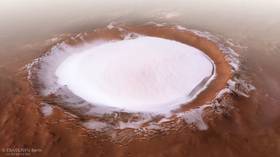‘No shred of evidence’: Iran demands US presents proof of Saudi oil attacks claim after UN report release
Tehran slammed the US for using a recent UN report to peddle its Saudi oil attack claims, accusing Washington of “clutching at every straw” to back up the allegations, while the report itself is based on shaky hypotheses.
“Just hours after the attack on Saudi oil facilities on September 14, 2019, the US baselessly attributed it to Iran, but has failed so far to present any shred of evidence. Now, it clutches at every straw to seemingly prove its allegation,” the Iranian mission to the UN stated on Saturday. It was responding to the US mission doubling down on the White House’s claim that Iran was behind the September 14 twin attacks on facilities owned by Saudi oil giant Aramco in Abqaiq and Khureys.
Also on rt.com Saudis asked Russia to probe Aramco oilfield attack, Moscow will condemn Iran if it's responsible – PutinResponsibility for the attacks that briefly disrupted operations at the Abqaiq oil plant – the largest oil processing facility in the world – was claimed by Houthi rebels, who are embroiled in a five-year-long war with the ousted President Abdrabbuh Mansur Hadi backed by the Saudi-led coalition. However, immediately after the attacks took place, the US pointed the finger at Tehran without waiting for any fact-finding mission to be sent to the sites.
Commenting on the recently released UN Yemen panel report, which concluded that Houthi forces were “unlikely” responsible for the bombing since the operation was too “complex” and the “estimated” range of weaponry the militants supposedly possess would not have allowed for such launches from the rebel-held territory, the US mission recycled its allegations framing the report’s findings as a foregone conclusion.
“Iran attacked Saudi Arabian oil facilities on September 14, 2019. It was an attack not only against a sovereign state but against the global economy as well,” the note bluntly stated.
Firing back, Tehran pointed out that “nothing in that report validates the US allegation, which has already been rejected by Iran.”
The report does not name Iran as the culprit in the strikes. Moreover, the experts admitted that they did not have a chance to see the debris of the weapons that allegedly hit the facilities first-hand at the scenes as they had been partially cleaned up by Riyadh by the time they arrived.
Also on rt.com Yemen’s Houthi rebels say they attacked Saudi oil giant Aramco, airport & other ‘sensitive’ targets“It should be noted that the panel did not see any debris of the weapon systems on-site in Abqaiq and Khureys, as those had already been transported to Riyadh at the time of the visits on 20 and 21 September 2019,” the report states.
In addition to that, the experts further acknowledged that while they believe that this particular attack was not carried out by Houthis, "other attacks using the same weapons do seem to have been launched from Yemen."
The panel did not rule out either that Houthis could have been behind the twin strike, noting that “in theory, the attacks could have also been launched by Houthi forces either from within Saudi Arabia, from the territory of other countries, or even from sea or airborne launch platforms,” but called this scenario “highly unlikely.”
The Iranian mission said that the US note “represents another disinformation campaign against Iran,” arguing that it’s the US massive build-up, undertaken under the pretext of the “Iranian threat,” together with Washington’s “military adventurism” and “the unprecedented flow of sophisticated American weaponry” to the region that has become the “main source of instability and insecurity” in the Middle East.
Think your friends would be interested? Share this story!














